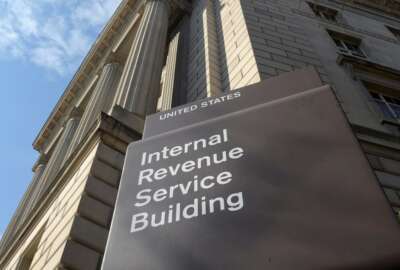
Anyone on DoD property will need to wear a mask
In today's Federal Newscast, Defense Secretary Mark Esper is directing that anyone on DoD property wear a cloth mask if they can’t consistently keep a six-foot...
To listen to the Federal Newscast on your phone or mobile device, subscribe in PodcastOne or Apple Podcasts. The best listening experience on desktop can be found using Chrome, Firefox or Safari.
- The Pentagon is embracing the CDC’s new recommendations on cloth face coverings. Defense Sec. Mark Esper is directing that anyone on DoD property wear a cloth mask if they can’t consistently keep a six-foot social distance from other people. The rules apply to servicemembers, civilians, contractors and military family members – except when they’re in their own homes. Esper says the military services will update their uniform regulations to account for masks, but until then, troops are being asked to make their own from household items like T-shirts. (Department of Defense)
- The IRS tackles new ground getting stimulus payments out the door while keeping the tax filing season running through July 15. A former IRS official told Federal News Network about 70-80% of stimulus payments should be easy to process, for taxpayers with direct deposit information on file. IRS and Treasury officials told the House Ways and Means Committee memo they expect to send 60 million payments by mid-April. By early May, the IRS will send out about 5 million paper checks per week. Agency officials estimate it could take up to 20 weeks to send all the checks. (Federal News Network)
- The sudden surge of federal employees teleworking is forcing DHS to make some cybersecurity changes. The Cybersecurity and Infrastructure Security Agency or CISA will release a telework-focused temporary Trusted Internet Connections 3.0 directive early this week. Federal News Network has learned that CISA wants to help relieve the latency of connecting back to agency networks through virtual private networks and to government cloud services, such as Office 365. The goal, according to multiple sources, is to give agencies more flexibility to keep employees connected to data and applications, but not lose any security rigor. Sources say the interim guidance is good for only the rest of the calendar year 2020. (Federal News Network)
- The Department of Homeland Security is adding extra layers of protection to its facilities. It is now only letting those employees and contractors into the building that have been given authorized access during the COVID-19 restricted access timeframe. DHS also may perform a health screen on any employee, contractor and visitor prior to entry. In a memo to contractors, DHS Chief Procurement Officer Soraya Correa says any contractor and subcontractor employees who are denied access to DHS facilities or work spaces should notify their employer and DHS contracting officers. (Department of Homeland Security)
- Sailors, dependents, retirees and Navy civilians will have to jump through a few more hoops to get their CAC cards for the next two months. The Navy is putting a halt to walk-in appointments for expiring and lost CAC cards. The service says it’s implementing the measure in response to COVID-19. Those who want to get a new CAC card must now make an appointment online first. Before entering the office, card renewers will need to answer a series of health related questions.
- Def. Sec. Mark Esper says he’s standing behind the Navy’s decision to remove the commander of the U.S.S. Theodore Roosevelt. At least for now. Esper says there are reviews underway about whether acting Navy Sec. Tom Modly made the right call when he relieved Capt. Brett Crozier, and that the results of those reviews are likely to end up on his desk. (Federal News Network)
- The Maritime Administration is about to make an important contract award. MARAD administrator Mark Buzby says a decision will likely take place this week on who will build the first of five new generation of National Security Multi-Mission Vessels. They’ll replace the aging training vessels now used by the maritime academies. They’ll be able to accommodate 600 cadets. The first one will go to State University of New York. The ships will also be available for humanitarian missions.
- Brigadier Gen. Robert Cooley is selected as the next chief of staff for the Army Reserve Headquarters. Cooley currently serves as the commander of the three hundred and fifty third Civil Affairs Command in New York. In the new position he will support more than 200,000 soldiers and civilian employees. He takes over for Maj. Gen. Marion Garcia, who is retiring after thirty two years of service.
- Congress is concerned about health and unemployment insurance for Peace Corps volunteers. The Peace Corps recalled six-thousand volunteers from overseas posts due to coronavirus concerns. But it’s unclear if they’ll qualify for unemployment insurance. And they’ll only have about two months of health insurance coverage when they return to the US. Lawmakers say the Peace Corps should give volunteers the option to temporarily work for FEMA to help out with coronavirus response. And they’re pushing for more clarity from the Labor Department on unemployment coverage for the volunteers. (Sen. Chris Van Hollen)
- Agencies can ask to waive the usual payment limits on recruitment, retention and relocation bonuses to help hire or keep critical talent for coronavirus response. The Office of Personnel Management is out with new guidance on how to ask for those waivers. Agencies can approve 3-Rs incentives up to a certain threshold without OPM approval. But payments larger than the usual 10 or 25% limit usually need a waiver. OPM says new templates will help agencies more quickly ask for OPM approval on 3-R incentives that exceed the typical cap. (Office of Personnel Management)
- The government’s main security clearance provider is still processing background investigations. The Defense Counterintelligence and Security Agency says security clearances are still moving during the coronavirus pandemic. Most of DCSA is teleworking. And investigators and adjudicators are working remotely. DCSA says it’s using the secure video conferencing capabilities it initially set up to help alleviate the backlog, to conduct interviews during the pandemic. The agency is also moving forward with adjudications, even without the usual fingerprint checks.
- The $2 trillion emergency spending bill gives the Postal Service a $10 billion line of credit. Now House and Senate Democrats call on the Treasury Department to give USPS that money as quickly as possible. A letter from lawmakers reminds Treasury that USPS has the final say on its business decisions. That includes hiring a new postmaster general. Rep. Gerry Connolly (D-Va.) one of the members who wrote the letter, told Federal News Network that Treasury and USPS proposed easing borrowing limits before the coronavirus pandemic. But in return, he says Treasury sought greater oversight of the Postal Service. (Federal News Network)
Copyright © 2025 Federal News Network. All rights reserved. This website is not intended for users located within the European Economic Area.
Eric White
Eric White is news anchor and Federal Drive producer at Federal News Network.
Follow @FEDERALNEWSCAST
Related Stories
New DHS guidance to address long-standing network issues as telework exacerbates the problems
(AP Photo/Susan Walsh)

IRS tackles ‘new ground’ juggling stimulus payments with extended filing season
Related Topics
All News
Brett Crozier
Centers for Disease Control and Prevention
Covid-19
Cybersecurity and Infrastructure Security Agency
Defense
Defense Counterintelligence and Security Agency
Department of Homeland Security
Federal Drive
FEMA
Gerry Connolly
IRS
Marion Garcia
Maritime Administration
Mark Buzby
Mark Esper
Peace Corps
Postal Service
Robert Cooley
Thomas Modly
Treasury Department



